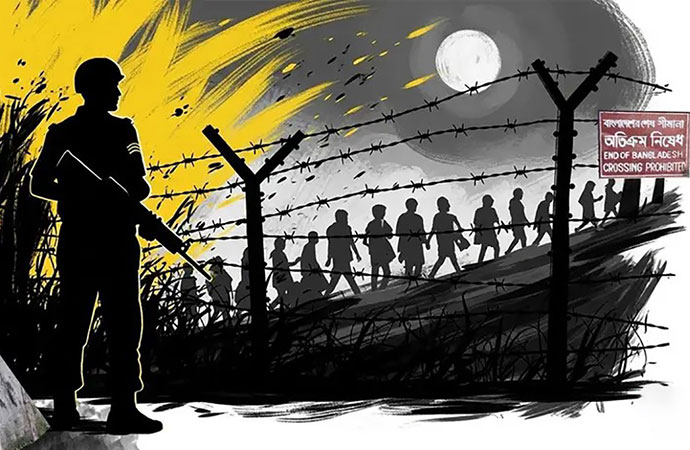Column

Image: Courtesy
The India-Bangladesh international border is the fifth longest land border in the world with a length of 4,096 km. The border is fraught with human security problems, including persistent border killings by India's Border Security Force (BSF) targeting Bangladeshi civilians. In recent weeks, India has resorted to the collective expulsion of persons deemed by the ruling BJP as illegal aliens despite many of these individuals having a legitimate and valid right to Indian citizenship. The ruling BJP accuses many Bengali-speaking Indian Muslim citizens of being Bangladeshis who illegally migrated across the porous border. However, many of those identified for deportation to Bangladesh, are in fact Indian citizens. The process of 'push-ins', by which people are forced to cross the border at gunpoint, is outside the ambit of due process. More than 1,200 people have been pushed across the border.
There have been several cases in which people were pushed across the border at gunpoint into Bangladesh by Indian security forces. Many of these people later returned to India after being verified as Indian citizens. Hence, India is forcibly transferring its own citizens into Bangladesh who are not citizens of Bangladesh. The 'push-ins' are likely being aided and abetted by smuggling and human trafficking networks. In many cases, Indian security forces are directly and forcibly pushing Indian citizens and perceived illegal aliens across the border at gunpoint.
This raises the question of India's obligations under the Protocol against Smuggling in a manner similar to the dispute between Lithuania and Belarus. By denying due process and pushing non-Bangladeshis into Bangladesh, India can be accused of breaching its obligations under the Protocol against Smuggling. India has been a state party to the protocol since 2011 while Bangladesh has not ratified the protocol.
Both India and Bangladesh have obligations under customary international law to ensure the principle of non-refoulement for refugees. A memorandum from the International Law Commission on the Expulsion of Aliens lays out that "A State has a broad discretionary right to expel aliens from its territory when their continuing presence is contrary to its interests subject to certain limitations and requirements. In contrast, the collective expulsion of a group of aliens as such (even a small group) is contrary to the very notion of the human rights of individuals and is therefore prohibited. The collective expulsion of a group of aliens does not take into account the consequences of the presence, the grounds and other factors affecting the expulsion, the procedural requirements for the expulsion or the rules relating to the implementation of the expulsion decision with respect to a single one of these aliens".
A newly instituted lawsuit at the International Court of Justice may also have implications for recent problems in border security between India and Bangladesh. Lithuania instituted proceedings against Belarus at the International Court of Justice. The case centers on the influx of migrants into Lithuania from Belarus across the border between the two countries in Eastern Europe. Lithuania has accused Belarus of being complicit in smuggling and human trafficking by failing to uphold due process. Lithuania's lawsuit alleges breaches by Belarus "of its obligations under the Protocol against the Smuggling of Migrants by Land, Sea and Air, supplementing the United Nations Convention against Transnational Organized Crime (the 'Protocol'), in relation to the large-scale smuggling of irregular migrants from Belarus into Lithuania". The lawsuit alleges that "[t]he smuggling of migrants through Belarus into Lithuania has caused serious harm to Lithuania's sovereignty, security, and public order, as well as to the rights and interests of the smuggled migrants themselves, who have been exposed to grave abuses in trying to reach Lithuanian territory".
Lithuania alleges that Belarus "breached many of its obligations under the Protocol by: facilitating, supporting, and enabling the smuggling of migrants, and also failing to take necessary border measures to prevent and detect the smuggling of migrants and to ensure the security and control of documents; failing to exchange information to prevent, detect, and investigate the smuggling of migrants, strengthen cooperation with Lithuania's border control agencies, and cooperate in the field of public information to prevent potential migrants from falling victim to organised criminalized groups; and failing to preserve and protect the rights of migrants and afford them appropriate assistance".
India must desist from illegally pushing people across the border, including its own citizens. The situation has arisen due to the discriminatory citizenship policies of the BJP, including the state government in Assam. The deterioration of Indo-Bangladesh relations has added to the layer of complexity which has given rise to the controversy.
Umran Chowdhury is Assistant Editor of the Dhaka Courier and a Research Associate at the Cosmos Foundation and Bay of Bengal Institute.

























Leave a Comment
Recent Posts
Religion and Politics: A Toxic ...
At Dhaka University, cafeteria workers have been told not to wear shor ...
Enayetullah Khan joins AsiaNet ...
AsiaNet’s annual board meeting and forum was held in Singapore, ...
In a New York minute
Many leaders back a UN call to address challenges to ..
Defaulted loans at Non-Bank Financial Institutions ( ..
How the late Zubeen Garg embodied cultural affinitie ..